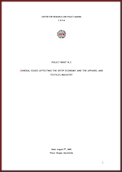
We kindly inform you that, as long as the subject affiliation of our 300.000+ articles is in progress, you might get unsufficient or no results on your third level or second level search. In this case, please broaden your search criteria.


Information on the 19th century history of pharmacy in Bulgaria is too scarce. Present publication includes documents for the development of pharmacy in Bulgaria from the documentary heritage of the Hungarian chemist Gyorgy Szilagyi, kept in the Bulgarian Historical Archive at the St. St. Cyril and Methodius National Library. Gyorgy Szilagyi's pharmacy existed for a period of eighty years, during which rich archival material accumulated. It is unique as a historical source for the development of pharmacy in Bulgaria, because it highlights the many-sided aspects of a foregn pharmacist's professional activities. Part of Gt. Szilagyi's archival fond are letters from his friends, acquaintances and colleagues that contain information on the fate of Hungarian and foreign pharmacists; they also reveal interesting facts about the relationship between Gy. Szilagui and his colleagues (local doctors and pharmacists) and clients as well. Another part of the fond is the documentation to the half-century-old activity of his pharmacy.
More...
Celem artykułu jest próba oceny znaczenia uczestnictwa Polski w jednolitym rynku europejskim dla wybranych uwarunkowań mobilności edukacyjnej i zawodowej młodych Polaków. Zasadniczą tezą jest natomiast stwierdzenie, że udział Polski we wspólnotowych programach edukacyjnych zwiększa szanse młodych ludzi na rynku pracy.
More...
Autor naświetla zagadnienia public relations w sytuacji kryzysowej. Przedstawia znaczenie reputacji dla przedsiębiorstwa, charakterystykę współczesnych sytuacji kryzysowych, a także planowanie i strategie działań informacyjnych w sytuacji kryzysowej.
More...
Autorka przedstawia korzyści, jakie może przynieść specjaliście do spraw public relations uwzględnienie w działaniach komunikacyjnych potencjału social media. W tym celu w pierwszej kolejności opisuje istotę mediów społecznościowych i ich cechy, by następnie omówić ich rodzaje oraz podstawowe instrumentarium, uwzględniając specyfikę m.in. Facebooka, LinkedIn, YouTube, Twittera, Instagrama, Wikipedii czy platformy blogowej Wordpress. Na tej podstawie autorka analizuje możliwe strategie działań z zakresu public relations realizowane za pomocą mediów społecznościowych oraz wyzwania dla public relations wiążące się z komunikowaniem w mediach nowych technologii.
More...
Autor naświetla zagadnienie, jaki wpływ na public relations mają cyfryzacja mediów i rozpowszechnienie komunikacji internetowej (w tym przez media społecznościowe).
More...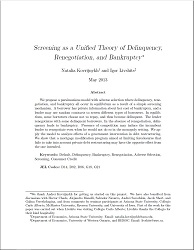
We propose a parsimonious model with adverse selection where delinquency, renegotiation, and bankruptcy all occur in equilibrium as a result of a simple screening mechanism. A borrower has private information about her cost of bankruptcy, and a lender may use random contracts to screen different types of borrowers. In equilibrium, some borrowers choose not to repay, and thus become delinquent. The lender renegotiates with some delinquent borrowers. In the absence of renegotiation, delinquency leads to bankruptcy. Presence of competition may induce the incumbent lender to renegotiate even when he would not do so in the monopoly setting. We apply the model to analyze effects of a government intervention in debt restructuring. We show that a mortgage modification program aimed at limiting foreclosures that fails to take into account private debt restructuring may have the opposite effect from the one intended.
More...
REFORM OF UKRAINE'S INSURANCE SYSTEM: CONCEPTUAL BACKGROUND // 1. THE INSURANCE MARKET SITUATION // 2. FACTORS THAT IMPEDE THE INSURANCE MARKET'S DEVELOPMENT // 3. DIRECTIONS OF INSURANCE MARKET REFORM // 4. CONCLUSIONS AND PROPOSALS // ROUND TABLE BY CORRESPONDENCE: PROBLEMS OF INSURANCE BUSINESS DEVELOPMENT IN UKRAINE // MODELS OF STATE REGULATION OF THE INSURANCE BUSINESS: EXPERIENCE OF WESTERN EUROPEAN COUNTRIES // PERSONNEL AND SCIENTIFIC SUPPORT FOR THE INSURANCE BUSINESS // IS THE STATE CAPABLE OF GUARANTEEING THE SOCIAL PROTECTION OF ITS DEFENDERS? // INSURANCE IN UKRAINE: REGULATORY AND LEGAL BACKGROUND // PEOPLE OF THE HAPPY MEDIUM? SKETCH OF A SOCIO-PSYCHOLOGICAL SELF-PORTRAIT // LIST OF PUBLICATIONS BY UCEPS' EXPERTS IN 2000
More...
THE STATE, PROBLEMS AND PROSPECTS OF THE INSURANCE MARKETIN UKRAINE // 1. THE STATE AND TRENDS OF THE INSURANCE MARKET // 2. PROBLEMS HINDERING THE DEYELOPMENT OF THE INSURANCE MARKET // 3. PROSPECTS OF THE INSURANCE MARKET // DEVELOPED INSURANCE BUSINESS AS A CATALYST OF ECONOMIC GROWTH // MEDICAL INSURANCE IN THE CONTEXT OF UKRAINE // REMOVING OBSTACLES TO NEW INSURANCE SERVICES // THE INSURANCE MARKET: ON THE THRESHOLD OF RADICAL CHANGES // SAFEGUARDING THE INTERESTS OF THE INSURANCE MARKET
More...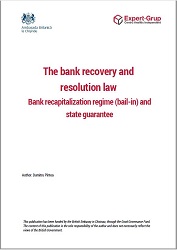
The bail-in procedure is a relatively new one at global level. Actually, according to Directive 2014/59/UE, up until now no European financial institution was salvaged from bankruptcy through bail-in5. Considering the complexity of the Directive, the existing contraindications between European governments regarding the bail-in procedure, as well as the extremely strong lobby from international financial groups, certain reluctance in implementing the provisions is present in several European countries. However, the recent history notes the use of bail-in in the Cyprus banking crisis, and more specifically, in the recovery of the financial situation in two financial institutions with systemic impact.
More...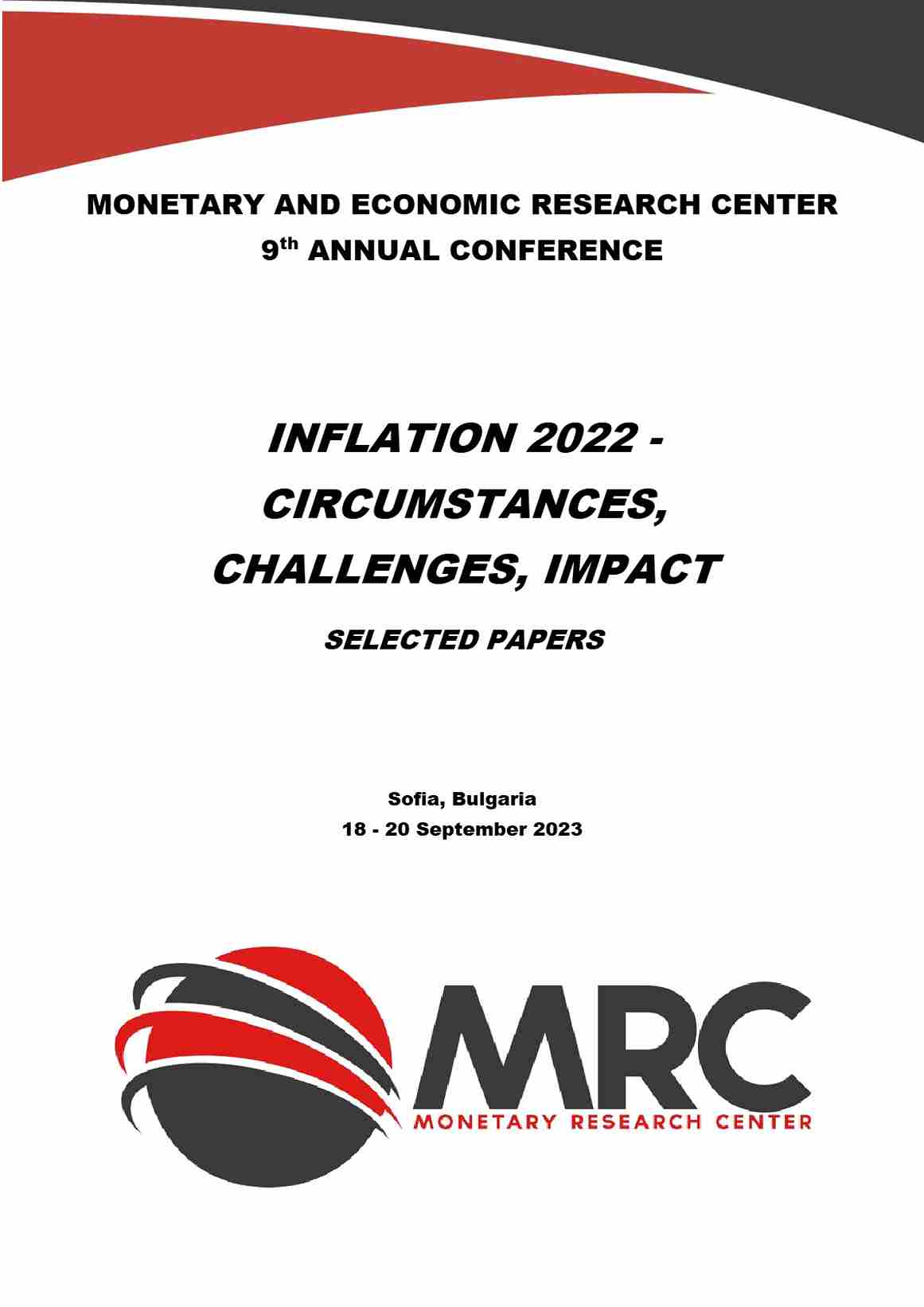
Given the important financial sector’s role in economies, the study examines whether there is a relationship between the GDP growth and financial development of CEE countries. For this purpose, first the causality is tested by means of Granger-causality test and then an attempt is made to assess the influence of one variable on the other. The GDP growth and financial development’s relationship is examined for the ten countries in CEE, with the period covered being 2010-2022. It is expected that financial development has a great importance for the improved growth in the studied countries. Data on loans, deposits in the banking system, and market capitalization as a share of GDP are used. The results confirmed that financial sector contributes positively to the realization of higher and stable GDP growth in CEE countries.
More...
The privatization of the security sector in Bosnia and Herzegovina (BiH) has not received much attention. Apart from the research of the Center for Small Arms Control in South Eastern Europe and Eastern Europe (SEESAC), which analyzed the state of the private security sector in South East Europe, as well as the research of the Center for Security Studies (CSS) from 2009, this is the second local research of the private security sector in Bosnia and Herzegovina. The aim of this research is to determine the trend of private security in BiH by comparing data obtained in 2009 and 2016. In order to provide a better understanding of the number and scope of private security in BiH, compared statistical data collected which show the scope of private security, i.e the number of legal subjects engaged in such activities and the number of certified staff working in this sector, will be presented below.
More...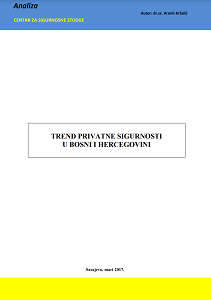
Privatizaciji sigurnosnog sektora u Bosni i Hercegovini (BiH) posvećeno je vrlo malo pažnje. Pored istraživanja Centra za kontrolu lakog naoružanja u jugoistočnoj i istočnoj Europi (SEESAC), kojim je analizirano stanje privatnog sigurnosnog sektora u jugoistočnoj Europi, kao i istraživanja Centra za sigurnosne studije (CSS) iz 2009. godine, ovo je drugo domaće istraživanje sektora privatne sigurnosti u BiH. Ovim istraživanjem nastojao se utvrditi trend privatne sigurnosti u BiH komparirajući podatke iz 2009. i 2016. godine. Radi boljeg razumijevanja brojnosti i veličine privatne sigurnosti u BiH, u nastavku će biti predstavljeni i komparirani prikupljeni statistički podaci koji pokazuju obim privatne sigurnosti, odnosno brojnost pravnih subjekata koji se bave takvim poslovima, kao i broj certificiranog osoblja.
More...
The behavioral economics upgrades the psychological characteristics of the economic agent, homo economicus, when analyzing an individual's decisions, emphasizing their biases. The nudge approach developed by Richard Thaler is a good tool for improving economic decisions made by the individual. The nudging policies, with their flexibility to different conditions, low financial burden, and low instrumental complexity, are widely applicable. The current high levels of inflation amplify the potential for nudges to improve the quality of people's economic decisions. This paper focuses on the possibilities of behavioral economics in the inequalities and promoting savings behavior provoked by current reality using smart disclosure and choice drivers, pre-commitment with setting consumption limits, and promoting the setting of aims.
More...
This article explores the green political agenda's evolution, particularly its rise as a driving force behind green industrial policies since the 2000s. These policies have become instrumental for governments aiming to bolster their national businesses' competitive edge and international trade roles. The paper is structured in three main sections. The first section traces the evolution of the Green agenda from the 1970s to the present, highlighting its transformation in policy makers' eyes to an economic and strategic tool in the 2000s. It explores how green industrial policies emerged, influencing international trade dynamics and national economic strategies. The second section delves into the specific aims and instruments of these policies over the past decades. The third section provides an examination of green industrial policy measures enacted by the US, the EU, and China in recent years. The conclusion highlights challenges for European decision-makers in crafting effective green industrial measures and suggests areas for future discussion.
More...
Since the adoption of the Paris Agreement in 2015, European banks have invested 1.331 billion US $ in fossil fuels (Banking on Climate Chaos, 2023). The level of profit serves as a key incentive for banks to continue their involvement with fossil fuels. However, some banks have stopped these practices and committed to no longer supporting the expansion of this sector. This article aims to explore the role of banks, particularly cooperative banks, in combating climate change. Our objective is to examine to what extent cooperative banks are better positioned to tackle the challenges posed by climate change. The legitimacy of these banks is demonstrated through their capacity to adapt in a constantly evolving environment, and their foundational characteristics actively contribute to climate action.
More...
One of the biggest challenges in developing countries is the shortage of accumulated capital, which must provide the necessary investment for economic growth. Developing countries are increasingly implementing policies targeting FDI to improve their international competitiveness and secure capital for economic development.
More...
The aim of the current paper is to examine theoretically the possibility robots to be treated as subjects under Bulgarian tax law. For this purpose, the author will outline the main hypotheses following the tax specifics of the legal personality. Taking into account the relevant provisions of the Bulgarian tax law acts, he will draw conclusion on the future tax treatment of robots.
More...
The paper surveys the development of the Optimal Currency Area theory and the Economic and Monetary Union. After a close examination of how Robert Mundell arrived at the former theoretical framework and its further elaboration by several economists, the paper draws the attempts at European economic and monetary unification. Based on the report One Market, One Money (1990), the author concludes that the economists of the European Commission did not follow the OCA theory, but used several contemporary monetary and macroeconomic findings to construct the theoretical framework behind the EMU.
More...
The dividend puzzle for private corporations has a long-lasting history. Six theories provide to certain extent explanations of this puzzle. However, the dividend puzzle has not yet been discussed as an economic problem for state-owned enterprises (SOEs). Thе article addresses this issue. All well-known six theoretical concepts of the dividend puzzle are presented and their strengths and weaknesses are analysed. After that, the specific features of SOEs are brought out and the dividend puzzle for them is formulated. After presenting the experience of the dividend policy of SOEs, a confrontation with the theories is made. It is proved that only the theory of dividend payment preference is relevant to SOEs.
More...